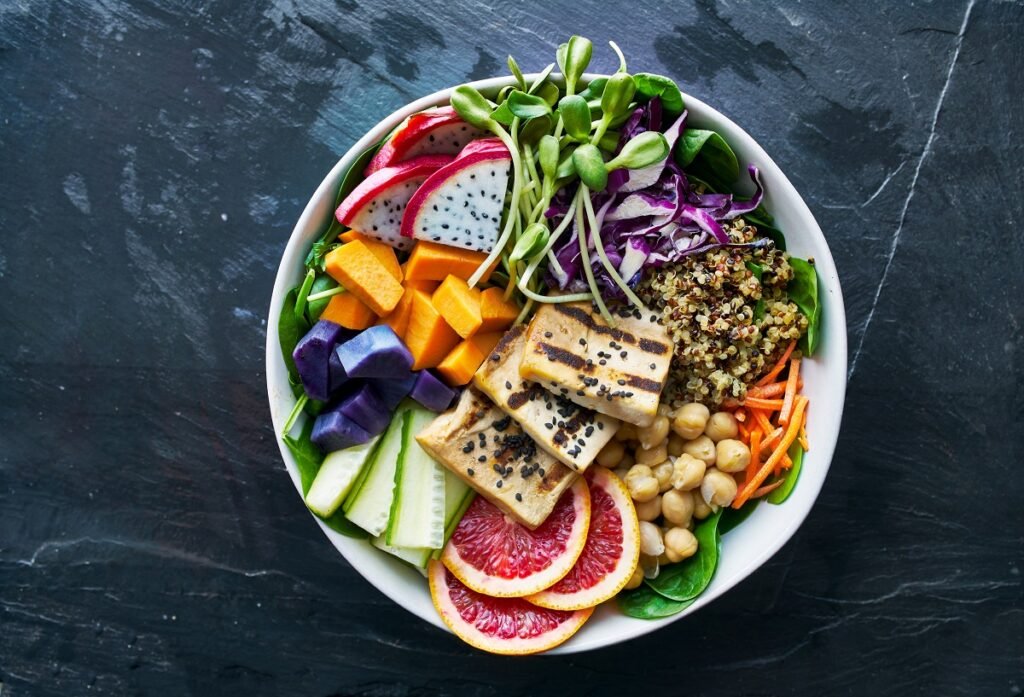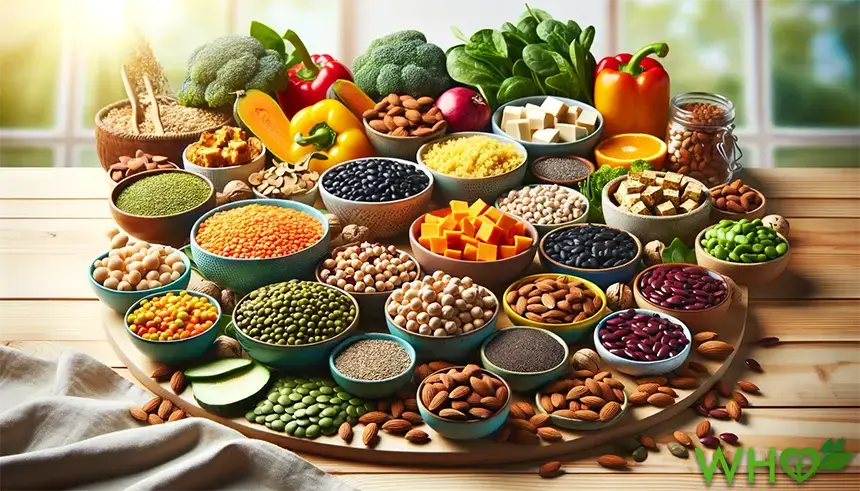Wellhealthorganic.com: Vegetarian Protein Sources | High Protein Rich Food 2024
Vegetarian diet is not only important for our health, but this food also helps in protecting us from obesity. Protein is essential for our body and vegetarian people often face protein deficiency. In this blog post, we will provide detailed information about the best vegetarian protein sources that will help you live a healthy and balanced life.

Importance of Vegetarian Protein Sources:
Protein is essential for the construction and repair of our body. It helps in building our muscles, bones, skin, hair, nails and organs. Including vegetarian protein in your diet can help maintain your muscular health, making your muscles grow and keeping you more active.
A common concern of vegetarians is that their diet may lack adequate protein. However, doctors and experts agree that a well-planned vegetarian diet can provide all the nutrients you need.
A protein-rich diet can help with weight loss, satiety, and building muscle strength. According to general dietary guidelines, women require 46 grams of protein a day and men require 56 grams of protein. But this amount may vary depending on your activity level, age, weight, and more.
So, if you are a vegetarian and worried about your protein intake, don’t worry, here is a list of vegetarian sources of protein that you can easily find in your kitchen.
Let us know about some important vegetarian protein sources.
1. Soya and Soya Products:
- Soya Dal: Soya dal is a major source of vegetarian protein. There is about 36 grams of protein per 100 grams of soya dal.
Benefits: The protein present in soya dal supports the optimal growth and repair of your body. Additionally, it is an excellent protein source for vegetarians and vegans.
- Soy Milk: Soy milk is also a most preferred source of protein. Contains approximately 8 grams of protein per serving (240 ml).
Benefits: The protein present in soy milk is good for you, which promotes bone health and strengthens muscles.
- Tofu: Tofu is also made from soy and is an excellent protein source. Per 100 grams of tofu contains about 8 grams of protein.
Benefits: The protein in tofu is good for your brain and heart health, and it may even help you lose weight.
2. Pulses
- Moong Dal: Moong Dal is an excellent vegetarian protein source. Per 100 grams of moong dal contains about 24 grams of protein.
Benefits: The protein present in moong dal becomes a source of energy for you and handles various functions of the body properly.
- Chickpea: Chickpea is also a good source of vegetarian protein. There is about 19 grams of protein per 100 grams of gram.
Benefits: The protein present in gram handles the everyday functions of your body, helps in reducing high blood pressure, and strengthens the body muscles.
- Cowpea: Cowpea is also a good source of protein. There are about 25 grams of protein per 100 grams of cowpea.
Benefits: The protein present in cowpea is a good source of essential amino acids for your body, which help in building and repairing muscles.
Also Read This Articles For More Benefits:
- Wellhealthorganic.com: weight loss in monsoon these 5 monsoon fruits can help you lose weight
- Wellhealthorganic.com: Vegetarian Protein Sources | Wellhealthorganic Ayush 2024
- wellhealthorganic high protein rich food for vegetarians to boost your health 2024
- Healthy Life Wellhealthorganic.com – You can Live it in 2024
3. Coriander and Coriander Products:
- Coriander: Coriander also contains good amount of protein. There is about 12 grams of protein per 100 grams of coriander.
Benefits: The protein present in coriander is important for you for muscle building and blood circulation.
- Coriander Products: Products made from coriander also contain good amount of protein. Such as dhania flakes, dhania chips, and dhania biscuits.
Benefits: Coriander products are also an excellent protein source for your body and help you live a healthy and fit life.
4. Nuts and Seeds:
- Walnuts: Walnuts are a good source of protein. There is about 15 grams of protein per 100 grams of walnuts.
Benefits: The proteins and nutrients present in walnuts are extremely beneficial for you, which nourish your body in the best way.
- Almonds: Almonds are also a good source of protein. There is about 21 grams of protein per 100 grams of almonds.
Benefits: The proteins and vitamins present in almonds are good for your body, which fulfill your daily needs.
- Cashew: Cashews make a quick snack to boost your protein intake. Both the protein and fiber in cashews help keep you full longer, so you’re less likely to indulge in vending machine treats in the afternoon.
Cashews are a great source of magnesium, which is good for constipation, boosts your immune system and supports cognitive function and contains biotin.
Cashew – 18 grams of protein per (100 grams)
Keep in mind:
- When including the best vegetarian protein sources into your diet, be sure to get the right amount of protein.
- Also, consider other nutrients, such as vitamins, minerals, and amino acids.
- By including different protein sources in your diet, you can have a balanced and complete diet.
- Consult a physician or nutritionist before using supplements.
- Choose your vegetarian diet sensitively, such as other fruits, vegetables, grains, and seeds
- Consult a doctor before using protein supplements.
- Include other nutrients in a healthy and balanced diet.
- Follow the instructions for the correct dosage and timing of supplements..
Consuming vegetarian protein sources is really important for your health. These sources contain protein as well as other nutrients that enable balanced growth and health of your body. By consuming vegetarian protein sources, you can live a healthy and active life and move toward your goals. Therefore, include the best vegetarian protein sources in your diet and stay healthy.
FAQS
Why is vegetarian protein important?
Vegetarian protein is an important source of essential amino acids for our body, which are essential for our body like the proteins obtained from meat and milk.
What are the main sources of vegetarian protein?
Main vegetarian protein sources include foods like soy, lentils, chickpeas, walnuts, seeds, and coriander.
What are the benefits of vegetarian protein?
Vegetarian protein boosts the body’s energy levels, strengthens muscles, helps in weight management, and has good heart benefits.
Can consuming vegetarian protein sources cause protein deficiency?
No, you can fulfill the protein deficiency by consuming vegetarian protein sources.
Do Vegetarians Play a Role in Protein Source?
Yes, vegetarian protein sources play an important role in building the brain, blood, bones, and muscles.
At what age can vegetarian protein be consumed?
Vegetarian protein intake is suitable for people of all ages, but children, young people, and the elderly need it more.
Are vegetarian protein sources safe for everyone?
Yes, vegetarian protein sources are safe for all age groups of people, but it is important to take care with individual allergies and the plant.
How can vegetarian protein sources be incorporated?
You can include vegetarian protein sources in your diet, such as pulses, grains, fruits, vegetables, nuts, and soy products.
Are supplements from vegetarian protein sources useful?
Yes, supplements from vegetarian protein sources can be useful if you are protein deficient. Take these supplements only after consulting your doctor and as per his instructions.
What quantity of vegetarian protein sources should be consumed?
Protein requirements vary depending on a person’s age, weight, and physical activity. Generally a person should take about 0.8 grams of protein per kilogram of body weight a day.
Can someone be allergic to vegetarian protein sources?
Yes, some people may be allergic to vegetarian protein sources, such as soy, nuts, and lentils. Such a person should consult his doctor before eating these.




